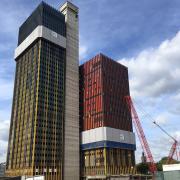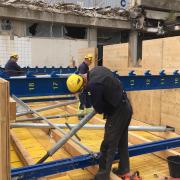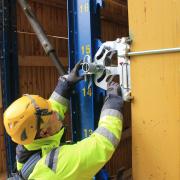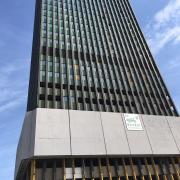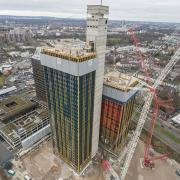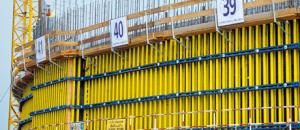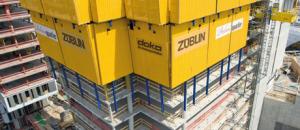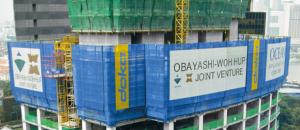
Press Contact
Impressions
Dismantling not blasting
“Deutsche Welle” radio editors worked in the high-rise building for 23 years. However, the building had been out of use since 2003, and in 2013 it was decided to tear it down. Initially, the plan was to use controlled blasting to demolish the 138 m high tower of the former “Deutsche Welle” studios. However, high levels of asbestos and concern for the nearby residents led to a change of plan: the building elements would be dismantled step by step. In light of the height of the building (the higher the building, the more challenges for solutions and techniques), BST Becker Sanierungstechnik GmbH, commissioned with the building demolition, decided on an unusual approach: they would engage Doka as their partner for the scheme. The formwork experts are generally called in during construction of concrete buildings, not for tearing them down. However, it turns out that the Doka system comprising the automatic climbing formwork Xclimb 60 combined with the Protection screen Xclimb 60 is actually perfect for dismantling buildings as well as for meeting the challenges of modern high-rise building construction.
The Protection screen Xclimb 60 enclosed the entire demolition area, sheltering the BST Becker Sanierungstechnik team completely from wind and weather. Rubber lips cut to fit perfectly between the protection screens and buildings created an integrated seal to prevent small parts, debris and dust from falling down. The system also effected a huge reduction in noise emissions.
Doka - expertise and solutions
Once BST Becker Sanierungstechnik had its first automatic climbing framework in place, complete with protective screen enclosure, Doka was able to offer its services beyond formwork. Doka’s project engineer, Philip Haug, explains: “We offer an all-round solution through our Ready-to-use service and pre-assembly teams. Thanks to our instructors and specialists from the project management and technical office, our services include advice and support, and ensure that even customers with no experience in automatic climbing technology can use our systems successfully.”
The platform and enclosure elements – 2,800 m² of screen in total – were pre-assembled from detailed plans into large transportable units by Doka’s Ready-to-use service teams. On-site, Doka’s pre-assembly team handled the final assembly and suspended the system on the building, thus speeding up the dismantling process. Despite several weeks of very high temperatures, the assembly was completed in under six weeks with no complications. Also present on site were the Doka instructors, who trained the construction site team for the automatic climbing system Operation Licence. This is required for operating an automatic climbing system.
In addition to the practical formwork engineering, the Doka formwork engineers provided a further valuable aid during the preliminary period: they planned every climb stage upwards and downwards, accounting for the different heights of the storeys and excess height on the intermediate floors. The Doka team also worked closely with the customer to develop project-specific custom suspension points where the protection screens would be affixed to the building. Typically, suspension points for a protection screen would be built in during concrete as part of the usual high-rise building process. This project, however, presented more of a challenge, since the suspension points had to be added to an existing building.
“As a demolition firm, we had virtually never come across a need for formwork before,” explains Michael Wagner, foreman for BST Becker Sanierungstechnik. “However, the Doka team were there to answer all our questions about the processes and gave us support in every way. We can recommend them unreservedly”.
Protection screen Xclimb 60 at work: 394 m of climbing
In order to make use of the protection screen straight away, during the upward climbing phase, work began in May 2019 to remove the façade with its colourful aluminium plates and asbestos-filled insulation. The BST Becker team used work platforms located directly behind the protection screen to access the cladding for the external columns and window elements. In autumn 2019, it was time for a change of direction; as the system climbed back down again, the steel structures and reinforced concrete floors and ceilings were removed. Two cranes lowered the wall and ceiling elements down to the ground, where they were broken up, processed and used to fill in the basement levels. “In total for the two towers, the protection screens covered a distance of 394 m”, says Philip Haug. “That’s approximately the height of the Empire State Building”.
The enclosure, façades and buildings worked their way downwards step by step until reaching the ground in August 2020. The demolition is scheduled for completion in 2021, creating space for a new residential complex with 700 apartments and inner courtyard gardens. Cologne’s former media landmark will be finally laid to rest in the history books.
This could also be of interest for you:
Do you have any questions on the article? Get in touch with us!
